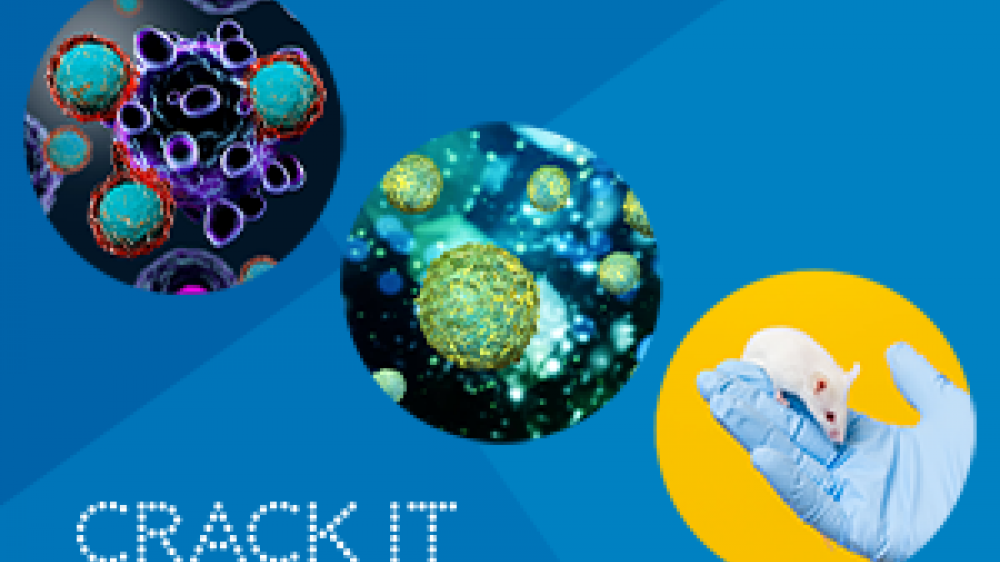£700k awarded to deliver the 2019 CRACK IT Challenges

Seven teams have been awarded funding in the 2019 CRACK IT Challenges competition, which brings together industry, academia and SMEs to develop marketable products or improve business processes that will have a significant 3Rs impact.
In 2019 there were three challenges:
Transgene Track – ‘Developing a non-invasive imaging approach to track CAR-T cells and AAVs in vivo’
Sponsored by GSK and Novartis, this Two Phase Challenge aims to develop a sensitive, absolute quantification method for tracking adeno-associated virus (AAV) gene therapies and chimeric antigen receptor T cells (CAR T-cells) in vivo.
Cell and gene therapies are emerging treatment modalities that offer new possibilities for the treatment of previously incurable conditions. Immunohistochemical and molecular analyses have been applied to determine the biodistribution, persistence and shedding of gene therapy products into tissues and tumour sites in vivo. However, they require the animals to be euthanised and are time consuming. These analyses also often demonstrate significant heterogeneity and do not provide information on the temporal and spatial localisation of the gene therapy, both within the target tissue and other organs.
Development of a sensitive non-invasive in vivo imaging technique would mean that the same animal could be followed for the whole length of the study, reducing the number of animals required by potentially more than 50%.
Three teams have been awarded funding to carry out Phase 1 proof-of-concept studies*:
- Dr James Simon, Cenya Imaging BV, The Netherlands
- Dr Tammy Kalber, University College London, UK
- Professor Wolfgang Weber, Technical University of Munich, Germany
CleanCut – ‘Establishing an in vitro model to assess the safety of genome edited human haematopoietic stem cells’
Sponsored by Bayer, Novartis and Takeda, this Two Phase Challenge aims to develop an in vitro model to replace in vivo tumourigenicity studies for the safety assessment of genome edited human haematopoietic stem cells (hHSCs).
A number of blood-related monogenic diseases, such as sickle cell anaemia and haemophilia, have the potential to be cured with genome edited hHSCs. Gene editing of hHSCs using designer nucleases (e.g. CRISPR) offers a high level of precision but can cleave undesired genomic regions causing off-target medications, which could generate cells with oncogenic potential. Currently, in vivo studies to assess the tumourigenicity of genome edited products are a regulatory requirement. These studies are lengthy, costly, require the use of large numbers of animals (e.g. mice) and are not always predictive of the risk to human safety.
Creation of an in vitro assay through this Challenge could replace these in vivo tumourigenicity studies.
Three teams have been awarded funding to carry out Phase 1 proof-of-concept studies*:
- Dr Uwe Marx, TissUse GmbH, Germany
- Professor Manuel Salmerón-Sánchez, University of Glasgow, UK
- Professor Manuela Raimondi, Politecnico di Milano, Italy
Sharp and to the Point – ‘Developing needles for high throughput and critical compound administration in mice’
Sponsored by AstraZeneca, GSK, The Royal Veterinary College and the University of Sheffield, this Single Phase Challenge aims to develop a device that enables injections in mice without losing material to dead space, allows needles to be changed quickly and safely between animals to ensure sharpness and sterility, and prevents cross-contamination between animals.
Single-use disposable needles are often used throughout medical research involving animals for injecting substances or for collecting blood samples. Sometimes needles are re-used to reduce time and cost because of the involvement of large numbers of mice and/or expensive test material. However, the re-use of needles results in a loss of sterility and can increase the risk of infection and disease transmission between individual animals and between cages. Re-use also risks dulling of the needle, potentially increasing the pain and discomfort associated with subsequent injections. These concerns create confounding and unnecessary variables which can impact the quality of scientific data collected.
Development of a new device for injections in mice that avoids the re-use of single-use needles could lead to a refinement in the delivery of substances, which would positively impact a high number of animals.
The successful applicant for this Challenge is:
- Mr Ian Quirk, Active Needle Technology Ltd, UK
*The CRACK IT Challenges competition is run using the Small Business Research Initiative (SBRI) process which is supported by Innovate UK. Phase 1 proof-of-concept stage winners for the Two Phase Challenges Transgene Track and CleanCut have the opportunity to apply for Phase 2 where a single contract of up to £1 million can be awarded to one team to deliver the full Challenge. Contractors for the Single Phase Challenge Sharp and to the Point have one year and up to £100k to solve the Challenge.
Further information about the CRACK IT Challenges competition process can be found at www.nc3rs.org.uk/crackit/crack-it-challenges.
